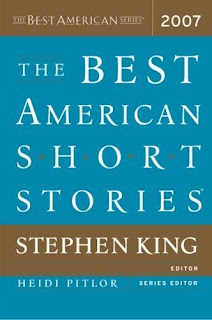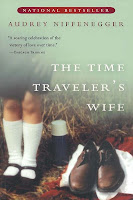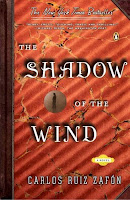Review: Riding the Doghouse by Randy DeVita
“Riding the Doghouse” by Randy DeVita (2006)
First Published in: West Branch, No. 58 Spring/Summer
Reprinted in The Best American Short Stories® 2007
I’ve actually read several short stories from this collection. However, I have had a difficult time with preparing their reviews. I am not sure why. Part of it, I must admit, is that I am used to having a story and its characters develop over time, thus I get to know them better – or at least feel as if I do. When the narrative is shortened, I must look a little deeper and work a little harder at comprehending the author’s intent. Of course, this is why I joined the above mentioned challenge. I wanted to stretch myself, and my sensibilities as a reader.
Previously, the only short stories I have read were ghost or horror stories; ones that are perfect for camp-outs and pajama parties. I loved them as a child, and I still do.
I think that is why I was drawn to this particular story by Randy DeVita. For it seems that not all ghosts prowl about creepy mansions in the middle of the night. Some live in the deep recesses of our memories: lurking, waiting, haunting.
As with other, classic ghost stories I remember, this one begins in the darkness of early morning:
“A storm outside. Beside me the soft breath of my wife shifts the covers that we share. I am dozing, trapped between midnight and dawn, and in my half-sleep, I listen as rain sleets against our bedroom window; oak branches, stripped by autumn, scrape at the back of the house. A surge of electrons excites the air; my ears hum. There is a violent crash, like a shattered windshield, and thunder drums past like traffic on the interstate. The windows rattle in their frames.
My eyes snap open.”
It is not only the storm that has awakened the narrator. And to explain why, would mean spoilers.
According to the author, this story derived at a time when he had
“been writing, with alarming consistency, pretty forgettable horror stories – stories far too consciously intended to scare others. So I challenged myself to write about something I feared,”
He also acknowledges that while revising the story, he discovered it was also a story about a relationship – that “Maybe that’s enough for a story – two people speaking to each other in a closed space, unwilling or unable to say what they really mean.”
In my opinion he succeeded in writing about both.
Sometimes the ghosts are of our own making. And that it is not what we say, but what we have not said, which haunts us.
I am giving this story 4 stars as I cannot say that it is a story I could not put down, however I did return to it often, and have even re-read it several times.



